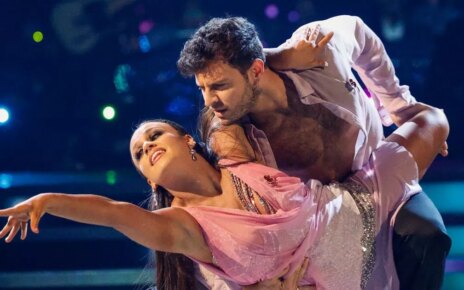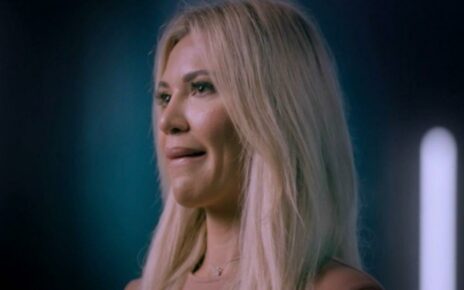Mia Wasikowska seemed to be everywhere at one point. Starting in 2010, the young actress was on a seemingly unending spree of plum roles in indie films and studio products alike, from Cary Fukunaga’s “Jane Eyre” to “Alice in Wonderland” and “The Kids Are All Right,” “Maps to the Stars,” Tracks,” “Stoker,” and “Crimson Peak.” But it seemed to stop when Tim Burton’s “Wonderland” sequel “Alice Through the Looking Glass” sputtered, a financial bleed-out for Disney that also took a critical beating, though not for Wasikowska’s performance. A not unheard-of phenomenon then occurred: A once in-demand, ubiquitous performer suddenly seemed to have vanished.
Well, the Australian actress never went away, exactly — she just stepped out of the limelight. “I want to do more things in life other than be in a trailer,” she told IndieWire in a recent interview discussing her new film “Blueback,” an endearing eco-conscious message movie directed by Aussie veteran filmmaker Robert Connolly. In it, she plays an oceanographer named Abby, who discovers a rare type of grouper fish and sets out to protect it against poachers.
A string of back-to-back high-profile projects in a row led Wasikowska to question whether she was burned out — and why she put up with unspecified mistreatment typical of up-and-comers, especially women. (“I think you would be hard-pressed to find any young woman who hasn’t experienced a level of abuse or inappropriate experiences or behavior towards them,” she told the Sydney Morning Herald last year.)
“I didn’t entirely like the lifestyle of going back to back to back. I felt really disconnected from any greater community,” she said, Zooming in from Sydney. “I was doing it since I had been 17, well more like 15, but really working a lot from 17, I spent 10 to 15 years, completely like, new city, new country, every three months, and it’s like starting school again every few months. Especially when you’re younger, when you don’t have that base, I found that really hard. At the same time, maybe if the payoff is good and you feel really great doing it, then that’s OK, but I didn’t, so I wanted to establish that for myself on a personal level and have more of a sense of somewhere I belong that’s not just on a film set that ends every few weeks.”


“Blueback”
Quiver Distribution
So Wasikowska gave up on Hollywood and, in the late 2010s, moved back to her home, Sydney, where she’s stayed ever since other than working on indie projects with directors she admires, including Mia Hansen-Løve on 2021’s “Bergman Island.” It feels like it’s been a while since she’s had a leading role, though.
And that’s not the case with “Blueback,” either. Wasikowska isn’t as present here as fans might hope: She plays the grown-up version of a younger Abby, who ends up dominating the story. Neither is her co-star, Eric Bana, who has what amounts to a cameo in the movie as a bearded fisherman, but who wound up serving as an executive producer to boost its platform.
In a moment of what feels like a pervasively hopeless attitude toward environmental doom, “Blueback” is a strange-sounding clarion call for … positivity about our current moment? Or, at the very least, it’s trying to feed into a certain kind of optimism instead of the complacent path toward self-destruction we collectively seem to be on.
It’s not typical fare from the actress known for playing the likes of a “perky psychopath” (“I loved [wearing] that prosthetic burn thing”) for David Cronenberg and a Victorian Gothic heroine for Guillermo del Toro or, even more recently, the tormented wife and eventual murder victim of an evangelical preacher in Antonio Campos’ “The Devil All the Time.”


“Maps to the Stars”
Focus Features/courtesy Everett Collect / Everett Collection
“It’s way more fun to play a character that’s not a role model. As an actor, you get to express all these things that [where], in real life, you’re not supposed to be like that, and you’re supposed to be angry. It’s great fun playing crazy, mad, angry characters. And then, you know, there are some times that you just want to sort of represent the best in people as well,” she said.
One role Wasikowska rues missing out on? Todd Haynes’ “Carol,” in which she was cast in 2012 as shopgirl Therese Belivet, a role that ultimately went to Rooney Mara — and won Mara Best Actress at Cannes before the movie became a timeless piece of queer iconography.
“I was attached to it a long time ago, and then a few things happened, and the shoot got pushed, and I signed onto Guillermo [del Toro]’s film ‘Crimson Peak.’ So I signed onto that and started having conversations with Guillermo and ‘Carol’ came back, and they’re like, ‘We’re going!’ And I was like, ‘I can’t now,’ so yeah, it was a bummer. It’s just part of it. You win some, you lose some.”
Would Wasikowska ever return to Hollywood full-time? That’s unlikely. “I’m pretty content. If I can have the best of both worlds, which is dip in and out of it occasionally, I’d be really happy, but I wouldn’t ever be in that place where I was just on a treadmill. I want to do more things in life other than be in a trailer. It’s great, and there are lots of great things, [but] the perception of it is quite different from the reality and it didn’t suit me as a person. You can really lose perspective because you’re treated quite strangely. When that’s your only reality, it’s quite strange.”
Source: Read Full Article

